
Hamilton is an inland city in the North Island of New Zealand. Located on the banks of the Waikato River, it is the seat and most populous city of the Waikato region. With a territorial population of 179,900, it is the country's fourth most-populous city. Encompassing a land area of about 110 km2 (42 sq mi), Hamilton is part of the wider Hamilton Urban Area, which also encompasses the nearby towns of Ngāruawāhia, Te Awamutu and Cambridge. In 2020, Hamilton was awarded the title of most beautiful large city in New Zealand.

The University of Waikato, is a public research university in Hamilton, New Zealand established in 1964. An additional campus is located in Tauranga. The university performs research in the disciplines of education, social sciences, and management and is an innovator in environmental science, marine and freshwater ecology, engineering and computer science. It offers degrees in health, engineering, computer science, management, Māori and Indigenous Studies, the arts, psychology, social sciences and education.
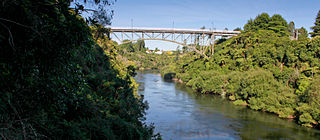
Cambridge is a town in the Waipa District of the Waikato region of the North Island of New Zealand. Situated 24 kilometres (15 mi) southeast of Hamilton, on the banks of the Waikato River, Cambridge is known as "The Town of Trees & Champions". The town has a population of 21,600, making it the largest town in the Waipa District, and the third largest urban area in the Waikato.

Huntly is a town in the Waikato district and region of the North Island of New Zealand. It was on State Highway 1, 95 kilometres (59 mi) south of Auckland and 32 kilometres (20 mi) north of Hamilton. It is situated on the North Island Main Trunk (NIMT) railway and straddles the Waikato River. Huntly is within the Waikato District which is in the northern part of the Waikato region local government area.
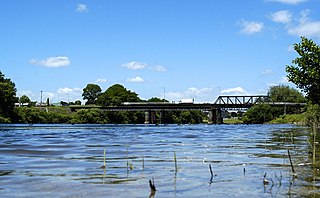
Ngāruawāhia is a town in the Waikato region of the North Island of New Zealand. It is located 20 kilometres (12 mi) north-west of Hamilton at the confluence of the Waikato and Waipā Rivers, adjacent to the Hakarimata Range. Ngāruawāhia is in the Hamilton Urban Area, the fourth largest urban area in New Zealand. The location was once considered as a potential capital of New Zealand.
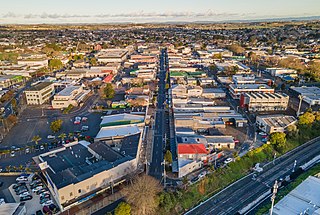
Pukekohe is a town in the Auckland Region of the North Island of New Zealand. Located at the southern edge of the Auckland Region, it is in South Auckland, between the southern shore of the Manukau Harbour and the mouth of the Waikato River. The hills of Pukekohe and nearby Bombay Hills form the natural southern limit of the Auckland region. Pukekohe is located within the political boundaries of the Auckland Council, following the abolition of the Franklin District Council on 1 November 2010.

Te Awamutu is a town in the Waikato region in the North Island of New Zealand. It is the council seat of the Waipa District and serves as a service town for the farming communities which surround it. Te Awamutu is located some 30 kilometres (19 mi) south of Hamilton on State Highway 3, one of the two main routes south from Auckland and Hamilton.
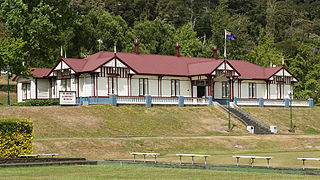
Te Aroha is a rural town in the Waikato region of New Zealand with a population of 3,906 people in the 2013 census, an increase of 138 people since 2006. It is 53 km (33 mi) northeast of Hamilton and 50 km (31 mi) south of Thames. It sits at the foot of 952 metres (3,123 ft) Mount Te Aroha, the highest point in the Kaimai Range.

Te Kauwhata is a small town in the north of the Waikato region of New Zealand, situated close to the western shore of Lake Waikare, some 40 km north of Hamilton and approximately 58 km south of Manukau City.

King's College, often informally referred to simply as King's, is an independent secondary boarding and day school in New Zealand. It educates over 1000 pupils, aged 13 to 18 years. King's was originally a single sex boys school but has admitted girls in the Sixth and Seventh forms since 1980, and in the Fifth form since 2016. King's was founded in 1896 by Graham Bruce. King's was originally situated in Remuera, Auckland on the site now occupied by King's School, Remuera, in 1922 the school moved to its present site in the South Auckland suburb of Ōtāhuhu.

Hamilton Boys' High School is a boys' secondary school in Hamilton, New Zealand and is the largest secondary school in the Waikato region. The school was established as Hamilton High School in 1911 but was later split into separate boys' and girls' schools, with the current school opened in February 1955. Its sister school is Hamilton Girls' High School. The school crest features a lion, sash and star, and bears the motto "Sapiens Fortunam Fingit Sibi" which translates to "a wise man carves his own fortune". The school colours are black and red.
The Maadi Cup is the prize for the New Zealand Secondary Schools Boys' Under 18 Rowing Eights. More colloquially, it is the name given to the New Zealand Secondary Schools Rowing Regatta, at which the Maadi Cup is raced. The regatta is the largest school sports event in the Southern Hemisphere, with over 2,087 rowers from 113 secondary schools participating in 2023 The regatta is held annually in late March, alternating between the country's two main rowing venues: Lake Karapiro near Cambridge, and Lake Ruataniwha near Twizel.

Hillcrest High School is a state coeducational secondary school located in south-eastern Hamilton, New Zealand. The school is named after the suburb of Hillcrest for which it serves, although the school itself is actually located in Silverdale. Opened in 1972, the school has a roll of 1758 students as of April 2023. making it the second-largest school in Hamilton.

Chartwell is a suburb in north-eastern Hamilton, New Zealand. The suburb was named after Chartwell, the country home of Sir Winston Churchill. The area became a part of Hamilton in June 1962 and was officially defined as a suburb in 1974. Most of the housing is private single or 2 level dwellings with little state housing. Streets near the square are used for parking. Private dwellings are being purchased by professionals to be used as business premises close to the square. The streets are well planted with trees.
James William Dallinger is a New Zealand rower. He was a member of the World Champion under-23 coxed four in 2006, and the world champion senior coxless four in 2007. He has been selected for the New Zealand coxless four to compete at the Beijing Olympics.

Sir David John Moxon is a New Zealand Anglican bishop. He was until June 2017, the Archbishop of Canterbury's Representative to the Holy See and Director of the Anglican Centre in Rome. He was previously the Bishop of Waikato in the Diocese of Waikato and Taranaki, the archbishop of the New Zealand dioceses and one of the three primates of the Anglican Church in Aotearoa, New Zealand and Polynesia. In the 2014 New Year Honours, he was appointed a Knight Companion of the New Zealand Order of Merit for services to the Anglican Church.
Caleb Shepherd is a New Zealand rowing cox. He holds the world best time in the men's coxed pair (2014) and represented at the Rio Olympics in the New Zealand eight. He coxed the New Zealand women's eight to their 2019 World Championship title and has been twice a world champion.
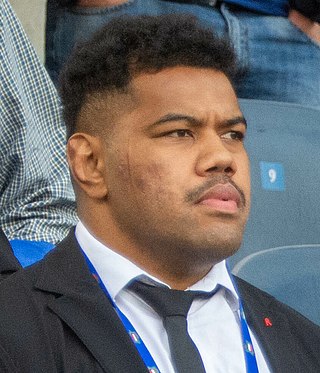
Samisoni Frank Simpson Taukei'aho is a professional rugby union player who plays as a hooker for Super Rugby club Chiefs. Born in Tonga, he represents New Zealand at international level after qualifying on residency grounds.
Paul Sidney Hodder is a former New Zealand rugby union player and cricketer, and is now a rugby union coach.
Aotearoa New Zealand's histories (ANZH) and Te Takanga o Te Wā are documents for use in English- and Maori-medium New Zealand curriculums from 2023 to guide the explicit and compulsory teaching about the country's history. Although the final documents, released in 2022, were part of reviews of the New Zealand education system by the newly elected Labour government from 2017, there had been pressure building prior to this for the focus of the reforms to be on developing a curriculum that truly reflected the history of New Zealand. This had included a petition taken to parliament in 2015 by high school students expressing concerns about how the New Zealand wars were being taught, ongoing debate in the media amongst academics and educationists and another petition urging teaching of New Zealand histories to be compulsory. In response to this, the government created an advisory group in 2018, and in 2019 initiated a recommendation from the group to establish an agreed process for updating the National Curriculum. After a process of consultation, draft documents were trialled and reviewed in 2021 and the final copies launched in March 2022, with the expectation that schools will have the reforms implemented by 2023.















